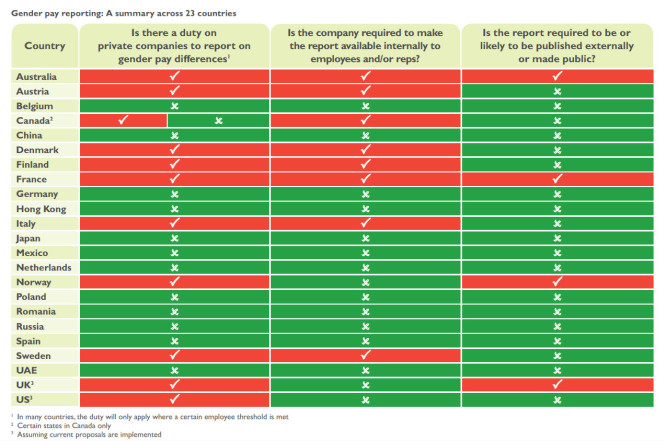Pay equity is a hot-button issue in the US. The EEOC and OFCCP have announced plans to begin collecting detailed pay information from US employers. Seven states have also passed legislation in the last twelve months changing the paradigm from equal pay for equal work, to equal pay for similar or comparable work. These states have also stripped away the affirmative defense under the Equal Pay Act permitting pay disparities based on any factor other than sex, to requiring that employers show a disparity is warranted by business needs.
This increasing focus on equal pay for women is not exclusively a US phenomenon. For example, both the UK and Australia are now addressing public reporting on gender pay gap for private-sector employers. Simply stated, equal pay is a global issue now and requires some strategic thinking across borders. A quick look at those countries in comparison to the US on the requirements for data collection and disclosure on pay equity is instructive:

Multi-national corporations need a three-step approach to equal pay compliance:
1. Monitor the developments (and emerging deadlines) on gender pay gap issues around the world. More is coming; there is no denying it. The EU and Japan have taken actions with respect to gender compositions in managerial positions and company boards; regulatory requirement in those jurisdictions may be more “when” than “if” propositions.
2. Determine whether gender pay reporting in individual countries may have any cross-border impact, either practically or legally (especially given that gender pay information in the UK and Australia will be made public), and whether — given the uncertainties around cross-Atlantic data privacy issues — mandated reporting obligations are better handled locally or at headquarters for better control of this issue.
3. Ask whether it is appropriate to self-evaluate or audit internally to identify potential issues of a gender-driven wage gap. There are pros and cons to either approach but the threshold issue is whether this can be done subject to attorney-client privilege or otherwise be safe from compelled disclosure in all jurisdictions.
PS: For more information on equal pay obligations in more countries, see DLA’s Gender Pay Survey encompassing 23 countries.


